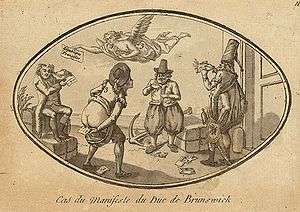Brunswick Manifesto

The Brunswick Manifesto was a proclamation issued by Charles William Ferdinand, Duke of Brunswick, commander of the Allied Army (principally Austrian and Prussian), on 25 July 1792 to the population of Paris, France during the War of the First Coalition. The Brunswick Manifesto threatened that if the French royal family were harmed, then French civilians would be harmed. It was a measure intended to intimidate Paris, but rather helped further spur the increasingly radical French Revolution and finally led to the war between revolutionary France and counter-revolutionary monarchies.
Background
On 20 April 1792, Revolutionary France declared war on Austria; on 28 April France invaded the Austrian Netherlands (present-day Belgium). Prussia joined the war against France, and on 30 July Austria and Prussia began an invasion of France, hoping to occupy Paris.
Brunswick Manifesto
On 25 July, the Duke of Brunswick issued the Brunswick Manifesto. The manifesto promised that if the French Royal family was not harmed, then the Allies would not harm French civilians or loot. However, if acts of violence or acts to humiliate the French Royal family were committed, the Allies threatened to burn Paris to the ground. The manifesto was written primarily by Louis Joseph de Bourbon, Prince de Condé, the leader of a large corps of French émigrés in Brunswick's army, and intended to intimidate Paris into submission. Brunswick maintained a secret correspondence with Louis XVI and Marie Antoinette, and two days before making the Manifesto public, he sent a copy to the Tuileries Palace, and both the king and the queen approved it. On August 1 news of the manifesto began sweeping through Paris. Many believed the Brunswick Manifesto was final proof that Louis XVI was collaborating with the Allies. Also on August 1, Prussian forces crossed the Rhine near Coblenz; consequently, the French National Assembly ordered that citizens prepare for war.
Impact
The Brunswick Manifesto, rather than intimidate the populace into submission, sent it into furious action and created fear and anger towards the Allies. It also spurred revolutionaries to take further action, organizing an uprising – on 10 August the Tuileries Palace was stormed in a bloody battle with Swiss Guards protecting it, the surviving of which were massacred by the mob. In late August and early September, the French were defeated in skirmishes with the Allied army, but on 20 September the French triumphed in the Battle of Valmy. Following its defeat, the Prussian army withdrew from France.
See also
| French Wikisource has original text related to this article: |
External links
References
- Connelly, Owen (2006). The wars of the French Revolution and Napoleon, 1792–1815. Routledge. ISBN 0-415-23984-2.
- Taylor, Brian (2006). The empire of the French : a chronology of the Revolutionary and Napoleonic Wars 1792–1815. Stroud, United Kingdom: Spellmount. ISBN 1-86227-254-9.